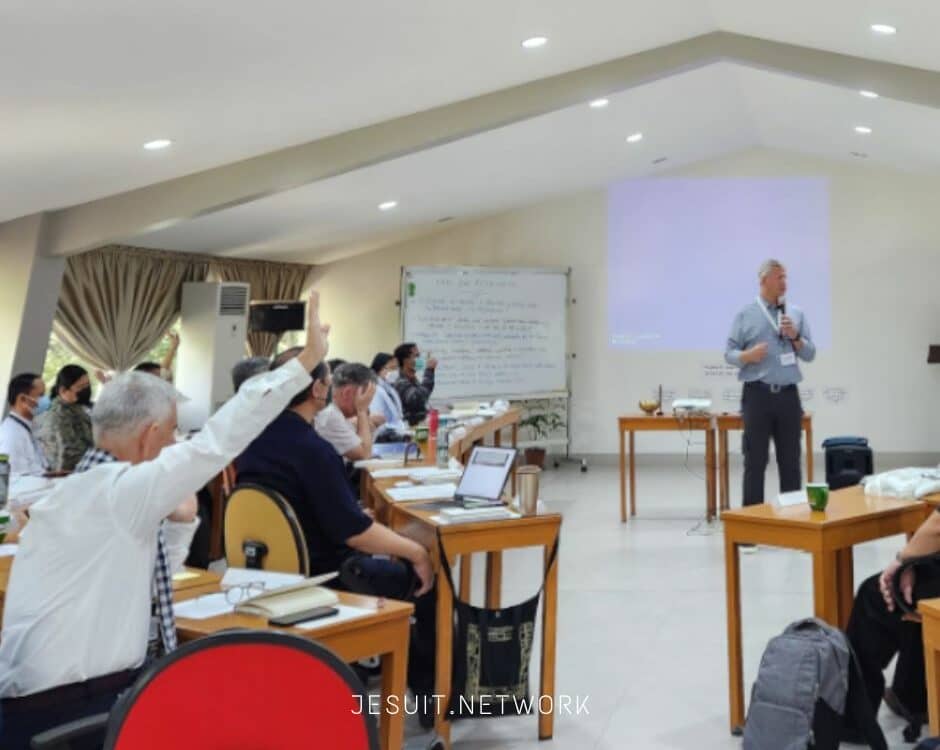This website uses cookies so that we can provide you with the best user experience possible. Cookie information is stored in your browser and performs functions such as recognising you when you return to our website and helping our team to understand which sections of the website you find most interesting and useful.
JCAP Social Apostolate Cultivating the Jesuit Identity
“What is the difference between our social centres and NGOs? What is Jesuit about our centres?” These are questions we often ask ourselves and rarely take seriously. Many social centres were started by individual Jesuits whose presence is taken as a marker for the identity of their institutions. Is this enough?
The Jesuit Conference of Asia Pacific (JCAP) social apostolate workshop, “Cultivating the Jesuit Identity of Social Ministries”, sought to answer these questions, and address organisational weaknesses often found in Jesuit social centres. Most of the 32 Jesuits and lay collaborators who gathered at Seven Fountains, Chiang Mai from August 13 to 17 were new directors and staff of Jesuit social centres in the region.
The workshop consisted of four parts. The first involved mapping the contexts where Jesuit institutions operate. JCAP President Fr. Tony Moreno, SJ, spoke of the new directions that JCAP is likely to take in light of the message of reconciliation from General Congregation 36 and the upcoming Universal Apostolic Preferences of the Society. Fr. Xavier Jeyaraj, SJ, Secretary of the Social Justice and Ecology Secretariat in Rome, described the social justice concerns the Society has had over the years and the new challenges in the future. Today, in particular, we face serious challenges from crises of democracy, serious ecological degradation, and increased migration. For Asia Pacific, Fr. Benny Juliawan, SJ, JCAP Secretary for the Social Apostolate, painted four situations: widening social-economic inequality, industrialisation with all its consequences, the end of stable employment and new forms of exploitation, and political populism.
The second part considered how to answer the question of identity. Julie Edwards, CEO, Jesuit Social Services Australia, invited the participants to identify Ignatian heritage and Jesuit traditions and practices that can be applied in an organisation. She used the image of a tree to show how the Ignatian heritage acts as roots that ground the tree and nurture it. The trunk represents the human spirit, practice framework and business processes in the organisation’s activities. The leaves are the people the organisation serves, the fruits of hard work and at the same time, the source of hope and joy that feed back to the organisation. Garry Roach, General Manager of Practice Development, JSS Australia, explained how these principles can be put into practice. He encouraged the participants to pay attention to developing a unifying narrative or story, telling the story in an accessible format, reinforcing the narrative in word and deed in multiple ways, assessing progress against the narrative, and supporting the staff from the beginning until the end of their employment.
The third part addressed two specific situations that Jesuit social centres often encounter: working in restrictive environments and combining social research and actions. Almost by nature, the Jesuit social apostolate looks for troubles such as working in politically sensitive contexts and challenging established traditions. Based on his experience in China, Fr. Fernando Azpiroz, SJ, outlined a framework of dialogue when faced with external restrictions. Ignatian spirituality and Jesuit traditions offer many insights in this regard. Fr. Pedro Walpole, SJ, then explained how to conduct research to effect social transformation together with communities, and offered strategies to bridge the gap between academic research and the needs of people on the ground.
In the fourth part, all these elements came together in an exercise in apostolic planning, something Fr. General Arturo Sosa, SJ, is actively promoting in our ministries. All too often, Jesuit social centres are stuck in the charism of the founder or in their established practices. “Even when we do planning, only a handful of people are usually involved and we forget our staff who will be implementing the programme,” said Christina Kheng, a church management expert who teaches at the East Asian Pastoral Institute. Another major issue in apostolic planning is how to connect and reconnect the foundational mission of the organisation with the nitty gritty of actions and activities. “Remember, our work is fundamentally a mission of the church. It is not just work or business,” she said.
The five-day workshop used an interactive method that required participants to read background reading material in advance, and then learn and reflect on case studies individually and in groups. The method proved fruitful.
“I feel confirmed that Ignatian spirituality gives a strong foundation to our social ministries,” said Indonesian Jesuit Fr. Kristiono who has just finished tertianship and been appointed director of a community development office in the Jakarta Archdiocese.
Casa Ricci staff Peter Au, who used to be second in command in the Macau government’s social work department, said, “This is very different from the way the government works especially the constant awareness of the mission that informs our day-to-day work.”
Some participants plan to review the strategic documents of their organisations in light of what they learnt in the workshop.
“It is our hope that this workshop helps address an important gap in our institutions which are mostly small and rely on lay collaborators,” said Fr. Benny Juliawan.





